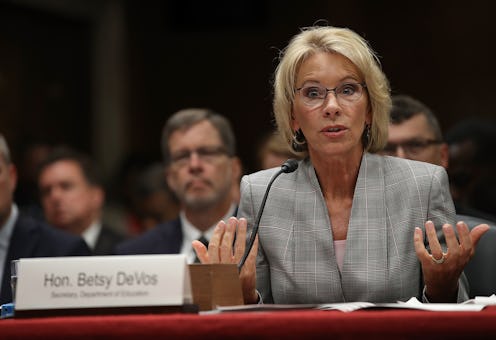
Education Secretary Betsy DeVos delivered a lengthy tirade against the former Obama administration's guideline on how campuses nationwide should deal with sexual assault. At George Mason University in Virginia, DeVos called the former president's Title IX ruling a source of "intimidation and coercion" that has resulted in a "failed system" that causes schools to "overreach." Since negative changes could be on the horizon, there are several points that sexual assault survivors should know about DeVos' Title IX speech.
For those who don't know, Title IX was first introduced in the Education Amendments of 1972. It was formed for a simple and fundamental cause: students throughout the United States need to be protected from sexual harassment and discriminatory attitudes based on gender. Under Obama's administration, the ordinance helped in investigating reported accusations of sexual assault on campuses.
Now, the education secretary has made it clear that she wants to "revise" Title IX. DeVos will apparently amend the guidelines so that people on "both" sides — the accuser and the accused — have a fair chance to justice. But during her speech, DeVos made a particular effort to side with the accused when she said things like, "Every student accused of sexual misconduct must know that guilt is not predetermined" and that there are people "who are wrongfully accused."
Lambasting the current process as a "failed system," Devos said, "It's no wonder so many call these proceedings [under Title IX] 'kangaroo courts.'"
However, there's confusion surrounding the specifics of DeVos' future plans. In an interview with CBS News freshly after her Thursday speech, DeVos informed Jan Crawford in an exclusive interview that the ultimate goal was to "revoke" Obama's Title IX guidelines.
When Crawford asked, "Are you today rescinding the Obama administration guidelines?" DeVos responded:
Well, that's the intention and we've begun the process to do so. As I've said earlier, in all of this discussion, it really is a process not an event. But it is the intention to move beyond that and move towards a better way.
During her speech, DeVos said that the Department of Education was seeking to learn from "better" models suggested by legal experts. One of these models is called the "Regional Center" which apparently involves a "voluntary opt-in center where professionally-trained experts handle Title IX investigations and adjudications." However, this process doesn't involve a "school-based tribunal," according to DeVos, something that differentiates it from the current guidelines.
DeVos may want to improve the current modus operandi for addressing sexual assault on campuses, but observers note that the education secretary's approach is a flawed one, reportedly taking counsel from Men's Rights Activists such as the National Coalition for Men (she has also taken counsel from sexual assault survivors, though).
The present picture is a foggy one: DeVos has flip-flopped on Title IX; in some instances, she says it will be "revised" while in others, she points to "revoking" the guidelines. The effects of revoking could lead to campus administrations not taking reports of gender discrimination and sexual assault seriously. It could lead to the shutting down or mishandling of cases currently under investigation. Most disturbingly, it could lead to an increase in sexual violence on campuses, which is already widespread and poorly addressed.
Right now, sexual assault survivors and allies can do several things to push against DeVos' plans. For instance, call your senator. Calls are reportedly effective in getting the attention of your senators, according to former congressional staffer Emily Ellsworth. Jot your points down, rehearse, and make yourself heard. In addition to that, check out feminist organizations, such as End Rape On Campus, which provides handy guides on everyday activism to address the current administration's approach toward Title IX.